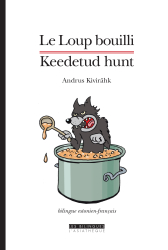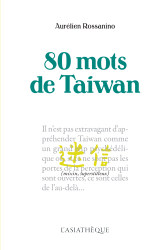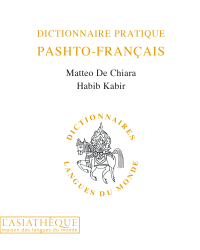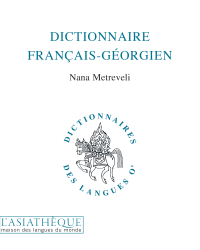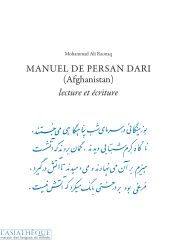Details
Format: Paperback
ISBN: 9782360570300
Collection: Langues INALCO
15.6 x 24 cm
Weight: 515 gr
Pages: 332
Edition :
2012
First publication: 19/11/1991
Last printing: 09/2020
Manuel de bengali (Livre + audio)
Bengali (or Bangla) is spoken by about 215 million people including over 140 million in Bangladesh. Calcutta is the capital of West Bengal, India. This manual provides the learning of standard language taught in schools and universities, and which is used by press, radio and television. This manual, like all of the collection is dedicated to students but also diplomats, business men and women and tourists. The text of each lesson is followed by exercises and grammatical explanations. Translations of the texts, keys to the exercises, and a glossary are all included at the end of the volume.
MEDIA LIBRARY
Audio recording
CONTRIBUTORS' BIOGRAPHIES
Pushkar Dasgupta
Pushkar Dasgupta, who was a professor at the Alliance Française in Calcutta and spent three years in France as a tutor at Inalco, is the author of the lesson texts and exercises.
France Bhattacharya
France Bhattacharya, wife of the poet Lokenath Bhattacharya deceased in 2001, lived 22 years in India. Professor emeritus of universities, she taught the language, as well as pre-colonial literature and culture of Bengal at Inalco until her retirement in 2001. She has published several translations of ancient and modern Bengali authors in French and works educational. She has notably translated some short stories by the poet Tagore as well as three novels published by Zulma: "Quatre chapters" (2005), "Charulata" (2009) and "Kumudini" (2013). He was awarded an Honoris causa doctorate by Rabindra Bharati University in Calcutta and the Saiyed Waliullah Prize by the Bangladesh Academy.
TABLE OF CONTENTS
Introduction
Présentation du volume
Les phonèmes du Bengali
Écriture
– Voyelles : formes complètes et abrégées
–Consonnes et consonnes jointes
– Méthode d'écriture
LEÇON 1 Binoybabu rencontre Paul
– Salutation
– Pronoms personnels singuliers
– Verbes: groupes de verbes, présent non-actualisé, impératif
– L'interrogation
– Les cas
– Pronoms et adverbes interrogatifs
– Ordre des mots
– Adverbes,
LEÇON 2 Présentations
– Verbe « être » copule
– L'âge
– Le genre
Leçon 3 Paul chez Binoybabu
– Pronoms personnels (suite)
– Pluriel des noms
– Verbes: types de conjugaison (suite)
– Impératif (suite)
– Verbe défectif ach- « être »
– Futur de l'indicatif
– Adverbes et post-positions
– Pronoms et adverbes interrogatifs
– La parenté
LEÇON 4 La famille de Binoybabu
– L'heure, les parties de la journée
– Adjectifs interrogatifs
– Adverbes
– Harmonie vocalique des verbes c v c,
– La parenté (suite)
LEÇON 5 Deux amis se rencontrent
– Les déterminants
– Présent actualisé
– Post-positions (suite),
– La phrase possessive
– Emploi de ar
– Présentatifs
– Interrogatifs (suite),
LEÇON 6 La lettre de Dhaka
– Verbes causatifs
– Emploi de tui
– Verbes di- et ni-
– Pronoms et adjectifs indéfinis
– La date, les mois, les jours de la semaine
– Nombres ordinaux
DEUXIÈME PARTIE
LEÇON 7 Au téléphone
– Verbe ach- (suite)
– Les verbes ach- et thak-
– Verbe hɔ -
– Emploi de to
– Forme verbale en -te
Les démonstratifs
– Les indéfinis
– Locutions verbales avec kor -et ha-
Locutions adverbiales
LEÇON 8 À l'épicerie
– L'impératif (suite),
– Le verbe lag- (suite)
– La phrase comparative et superlative
– Emploi de to (suite)
– Le prix
– Le système métrique
– Emploi de ki et kife
– Les indéfinis (suite)
– Emploi de kach et kache
LEÇON 9 L'inconnu dans la maison
– Forme verbale en -te (suite)
– L'absolutif
– Verbes composés avec opérateur verbal
– Post-positions
– Le réfléchi nije
LEÇON 10 La journée de Binoybabu
– Le perfectif présent
– Le duratif
– Usage adverbial de kore
– Redoublement d'un pronom indéfini ou d'un interrogatif
– Le discours indirect
– L'affixe -œk
LEÇON 11 Demandeur d'emploi
– Emploi interrogatif de ki,
– Impératif (suite),
– Emploi des affixes -kar ou -ker
– kono et kon (révision)
– Les déterminants (suite)
LEÇON 12 Un journaliste chez Binoybabu
– Substantif verbal
– Expression de l'hypothétique,
– Proposition circonstancielle de cause
– La particule intensive i,
–La particule conjonctive o,
– La voix passive
– Construction avec mone hɔ -
– Emploi de chara
– La réduplication
Traductions et corrigés d'exercices
Glossaire

